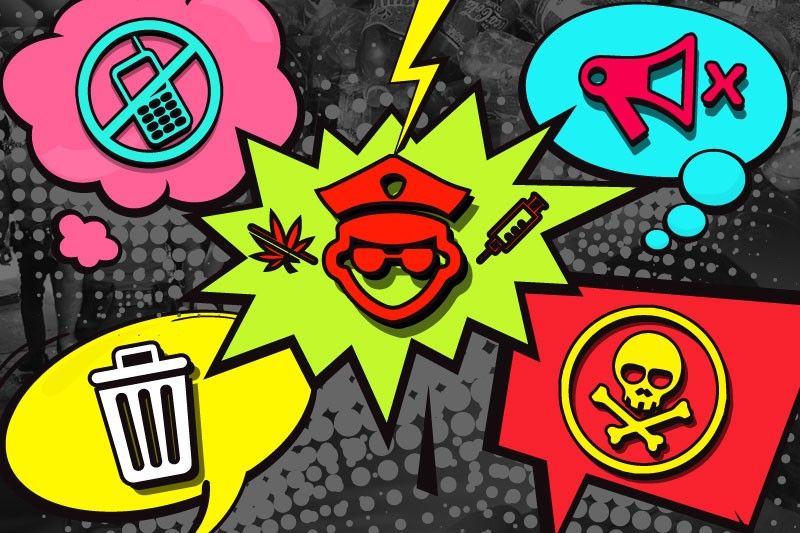What are the words of the year in 2018 and why were they chosen?

MANILA, Philippines — It’s that time of year when dictionary editors—and even ordinary individuals—decide on a word, which they believe sums up the human experience and the state of the world in the passing year.
As early as October, organizations began announcing their respective winning words. The selections were driven by trends and issues in the realms of politics, social movements, environment and technology.
Some of the words reflect the mood of the past 12 months, while others won by popular vote.
Here is a rundown of the winners and why are they chosen:
Toxic
The word “toxic”—whose literal use refers to poisonous substances—has been always present in discussions of the health and the environment—“toxic air,” “toxic chemicals” and “toxic waste.”
“Toxic” is also being used to describe workplaces, cultures, relationships and even masculinity as driven by the #MeToo movement.
The word’s “sheer scope of its application” made it the Word of the Year of the esteemed Oxford Dictionaries.
“This year more than ever, people have been using toxic to describe a wide array of things, situations, concerns and events,” Oxford Dictionaries said, noting there has been a 45 percent increase in the number of times it has been looked up on its website.
In an interview with TIME, Oxford Editor Katherine Martin said that toxic is a word that touches “on almost all the preoccupations we could think of that have characterized this year… literally and metaphorically.”
Oxford said its annual word of the year must sum up the ethos, mood or preoccupations of the passing year and have lasting potential as a term of cultural significance.
It chose “youthquake”—a significant cultural, political or social change arising from the actions or influence of young people—in 2017. In 2016, it selected “post-truth,” which describes the blurring of truth and function.
The runners-up for Oxford Word of the Year 2018 were: “gaslighting,” incel,” “techlash,” “gammon,” “big dick energy,” “cakeism,” “overtourism” and “orbiting.”
Misinformation
The rampant spread of false information led Dictionary.com to pick “misinformation” as its 2018 Word of the Year. While the word has been around since the late 1500s, the rise of social media has changed how information is shared, the online dictionary said.
Dictionary.com defines it as “false information that is spread, regardless of whether there is intent to mislead.” But while it can be perpetuated by accident or error unlike “disinformation,” “misinformation” can lead to disaster, violence and death.
In an interview with Associated Press, Jane Solomon, a linguist-in-residence at Dictionary.com, said the choice of “misinformation” was intended to serve as a “call to action.”
“The rampant spread of misinformation is really providing new challenges for navigating life in 2018… We believe that understanding the concept of misinformation is vital to identifying misinformation as we encounter it in the wild and that could ultimately help curb its impact,” Solomon said.
She also said the word “frames what we’ve all been through in the last 12 months.”
The runners-up for Dictionary.com’s 2018 Word of the Year included “representation,” “self-made” and “backlash.”
Single-use
The Collins Dictionary took a “green” route in its latest Word of the Year as it bestowed its annual award to “single-use.” The word has been blamed for damaging the environment and affecting the food chain.
“Single-use”—according to Collins—refers to “products, often plastic, that are ‘made to be used once only’ before disposal.”
“From plastic bags, bottles and straws to washable nappies, we have become more conscious of how our habits and behaviours can impact the environment,” Collins said on its website.
Collins’ research found that “single-use” is now four times as common as it was in 2013 following the rise in public concern over the environmental impact of throwaway plastics over the last 12 months.
Sens. Risa Hontiveros and Sen. Loren Legarda filed separate bills seeking to prohibit restaurants and other establishments from offering single-use plastic products.
Nomophobia
Based on the results of popular vote, “nomophobia” was named by Cambridge Dictionary as the “People’s Word of 2018.”
“Nomophobia” refers to the “fear or worry at the idea of being without your mobile phone or unable to use it.
“Like many modern coinages, ‘nomophobia’ is what’s called a blend: a new word made up of syllables from two or more words, in this case ‘no mobile phone phobia,’” Cambridge said on a blog post.
Other words on the shortlist for the People’s Word of 2018 were “gender gap,” “ecocide” and “no-platforming.”
Tokhang
“Tokhang”—code name of the anti-illegal drug campaign of the Philippine National Police, which has claimed lives of thousands of suspected drug users and pushers, was chosen as “Salita ng Taon” by the Komisyon sa Wikang Filipino, the Filipinas Institute of Translation and the University of the Philippines.
“Tokhang” is a combination of Visayan words “toktok” (to knock) and “hangyo” (to plead). It was implemented by former PNP chief Ronald Dela Rosa to convince drug offenders to surrender.
KWF chairman Virgilio Almario said the selection of “tokhang” as word of the year was a proof that “people were able to digest the word and the violence that came with it.”
“They were able to laugh at it… by making jokes [of] it, people would think that it just became part of their lives and that it would transcend and could be even corrected,” Almario told The STAR.
“Tokhang” bested words such as “Dengvaxia,” “DDS,” “dilawan,” “fake news,” “federalism,” “foodie,” “quo warranto,” “resibo,” “TRAIN” and “troll.”
- Latest
- Trending
































